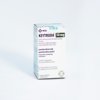Fritextsökning
Artiklar per år
Innehållstyper
-

The vaccine has saved 94 million lives – but measles is spreading again
A disease we once believed belonged to the past is now resurging in both Europe and the United States. In the shadow of growing skepticism and declining vaccination coverage, measles – which has claimed millions of lives throughout history – is making a comeback.
-

Heart Monitoring in Breast Cancer – Essential or Excessive?
Trastuzumab and related drugs have transformed breast cancer treatment and dramatically improved survival rates. But the close cardiac monitoring required during treatment can be a heavy burden for both patients and healthcare systems. Dr. Andri Papakonstantinou is working to refine how doctors identify which patients truly need intensive follow-up.
-

Novo Nordisk appoints Mike Doustdar as new CEO
The Danish pharmaceutical giant Novo Nordisk has appointed Mike Doustdar as its new CEO. At the same time, the company announced it was lowering its forecasts – which caused the stock to drop sharply on Wednesday.
-

US Health Secretary Kennedy dismisses all vaccine experts – assembles new committee
Robert F. Kennedy Jr. has dismissed all 17 members of the CDC’s vaccine advisory panel. A new group of experts will be appointed directly by the Health Secretary, his department announced.
-

Charged with illegal pharmaceutical sales – alleged earnings of 23 million
For at least five years, two men allegedly carried out illegal sales of pharmaceuticals and supplements, amassing millions. They are now facing charges at Södertörn District Court in Huddinge, south of Stockholm.
-

Virology professor on the threat from X: ”The next pandemic could be worse“
The question is not if, but when we will be affected by a new unknown virus that causes yet another pandemic. Are we sufficiently prepared? "Absolutely not!", responds virologist Niklas Arnberg.
-

Getinge and Neobiomics received Swecare's export awards
Two companies received awards during Swecare's annual conference.
-

Astra Zeneca faces potential multimillion-dollar fines in China
Astra Zeneca could be forced to pay up up to $8 million in fines for allegedly unpaid import duties in China, as the company seeks to rebuild trust following earlier controversies.
-

Merck KGaA acquires American company in €3.0 billion deal
Germany’s Merck is completing the acquisition of Springwork Therapeutics for 3 billion euros.
-

After the threat of tariffs – Novartis invests 230 billion in the USA
Pharmaceutical giant Novartis plans to invest 23 billion dollarsover the next five years to expand its production in the USA. The goal is for all medicines destined for the US market to be produced within the country.
-

Aqilion's licensing journey: From Merck partnership to new opportunities
Be extremely meticulous with your scientific data, but spend just as much time and effort on business development. That piece of advice comes from Aqilion's CEO Sarah Fredriksson and is directed at biotech companies aiming to find a good licensing partner.
-

Who pays for Rebecca Doe – and all of us?
Anna Törner on how easily we get used to the idea that healthcare is free - when it really is about how and who pays for it
-

The art of successful licensing – “A lot has to align”
Sharp research, strong data and a high level of innovation are all very good, but more than that is required to achieve the goal of many biotechnology companies: to succeed with a licensing deal.
-

AI detects tumor disease – via voice recording
A short voice recording along with facial images – both analyzed with an AI algorithm – can make it possible to detect the rare tumour disease acromegaly and initiate treatment at an early stage.
-

We desire talent to come here, but are we genuinely welcoming them?
Sweden faces significant challenges in creating a truly inclusive environment that makes international professionals feel welcome, valued, and able to build meaningful careers, writes Sarah Lidé in a column.
-

The business coach: “We need to learn from our mistakes”
The past year has been challenging for many biotech companies, with several comapanies facing financial stress and bankruptcy. To understand how entrepreneurs can navigate these tough times, Life Science Sweden spoke to Pia Keyser, a business coach
-

Novo Nordisk establishes new factory in Denmark
Novo Nordisk establishes a new production facility in Odense, Denmark, an investment of 8.5 billion Danish kroner.
-

Hypothesis testing versus conspiracy theory
"How do you know what is a conspiracy theory and what is a reasonable, scientifically based conclusion?" In a column, Ingrid Lönnstedt reflects on this question.
-

Anna Törner: ”If I fall seriously ill, I’ll move to Finland”
”It is both undignified and undemocratic that cancer patients must travel to Finland to uphold a façade of fairness that does not truly exist”, Anna Törner writes in a column.
-

Takeover bid is being completed – Japanese company acquires Calliditas
Japanese company Asahi Kasei completes the bid for Calliditas Therapeutics after reaching over 90 percent of the shareholding. Callidita's board has now decided to apply for delisting of the company´s share from Nasdaq Stockholm.
-

MSD discontinues two Keytruda trials
MSD has stopped two late-stage trials that tested its blockbuster immunotherapy Keytruda as a treatment for skin and lung cancer.
-

Gothenburg, the city of life science – We are ‘Little Boston’
Western Sweden is investing in life science within everything from advanced therapeutic drugs to femtech. At the same time, stakeholders are looking to other industries for inspiration and knowledge.
-

Carl Borrebaeck – professor and serial entrepreneur with a taste for speed
Award-winning cancer researcher, the founder of many listed companies, and constantly in the academic and commercial spotlight for decades. However, Carl Borrebaeck, Professor of Immunotechnology at Lund, is not yet satisfied. “We have a new, potentially super exciting project in the pipeline,” he says.
-

To build trust, one must be able to say “I don’t know” – whether human or AI
Will AI strengthen or break down trust? It depends on whether we can understand and accept its limitations, and our own, writes Sarah Lidé in a column.